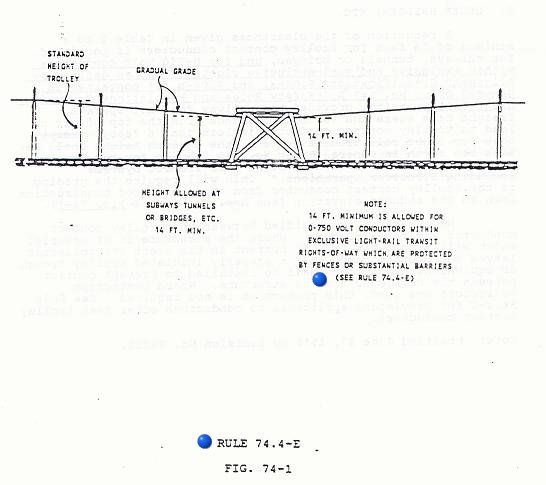
Original Version
Rule 74.4-E
74.4-E. Under Bridges, Etc.
A reduction of the clearances
given in Table 1 to a minimum of 14 feet for trolley contact conductors is
permitted for subways, tunnels or bridges, provided the railway does not
operate freight cars where the vertical distance from the top of car or load to
trolley contact conductor is less than 6 feet, except that for light rail
transit systems, the minimum height shall be that set forth in General Order
No. 143, "Rules for the Design, Construction and Operation of Light Rail
Transit Systems Including Streetcar Operations." This will require the grading of the trolley contact conductor
from the prescribed construction down to the reduced elevation. (See App. G, Fig. 64)
No clearance is specified between
the trolley contact conductor and the structure. Where the structure is of material which will ground the trolley
current in event the collector leaves the contact conductor, a properly
insulated trolley trough or equivalent protection shall be installed to prevent
contact between the collector and the structure. Where pantograph collectors are used, this protection is not
required. See Rule 54.4-I for
provisions applicable to conductors other than trolley contact conductors.
Strikeout and Underline Version
Rule 74.4-E
74.4-E. Under Bridges, Etc.
A reduction of the clearances
given in Table 1 to a minimum of 14 feet for trolley contact conductors is
permitted for subways, tunnels or bridges, and for 0-750 volt conductors
within exclusive and semi-exclusive rights-of-way as defined by Alignment
Classifications 9.04-a and 9.04-b(1) contained in General Order No. 143-A. “Safety Rules and Regulations Governing
Light Rail Transit”, provided the railway does not operate freight cars
where the vertical distance from the top of car or load to trolley contact
conductor is less than 6 feet., except that for light rail transit
systems, the minimum height shall be that set forth in General Order No. 143,
"Rules for the Design, Construction and Operation of Light Rail Transit
Systems Including Streetcar Operations."
This will require the grading of the trolley contact conductor from
the prescribed construction down to the reduced elevation. (See App. G, Fig. 64 Fig. 74-1)
No clearance is specified between the trolley contact conductor and the structure. Where the structure is of material which will ground the trolley current in event the collector leaves the contact conductor, a properly insulated trolley trough or equivalent protection shall be installed to prevent contact between the collector and the structure. Where pantograph collectors are used, this protection is not required. See Rule 54.4-I for provisions applicable to conductors other than trolley contact conductors.

Final Version
Rule 74.4-E
74.4-E. Under Bridges, Etc.
A reduction of the clearances
given in Table 1 to a minimum of 14 feet for trolley contact conductors is
permitted for subways, tunnels or bridges, and for 0-750 volt conductors within
exclusive and semi-exclusive rights-of-way as defined by Alignment
Classifications 9.04-a and 9.04-b(1) contained in General Order No. 143-A. “Safety Rules and Regulations Governing
Light Rail Transit”, provided the railway does not operate freight cars where
the vertical distance from the top of car or load to trolley contact conductor
is less than 6 feet. This will require the grading of the trolley
contact conductor from the prescribed construction down to the reduced
elevation. (See Fig. 74-1)
No clearance is specified between
the trolley contact conductor and the structure. Where the structure is of material which will ground the trolley
current in event the collector leaves the contact conductor, a properly
insulated trolley trough or equivalent protection shall be installed to prevent
contact between the collector and the structure. Where pantograph collectors are used, this protection is not
required. See Rule 54.4-I for
provisions applicable to conductors other than trolley contact conductors.
